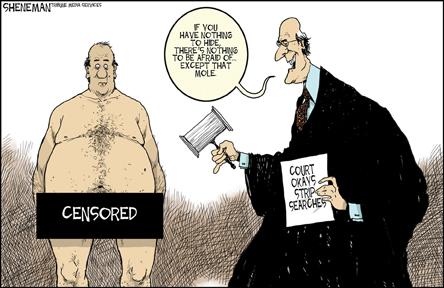
Under what circumstances is it necessary to strip search someone? What level of reasonable suspicion should exist before a detainee is forced to remove their clothes and submit to the most intimate inspection possible? Personal liberty is a core principle in the collective American psyche, and it is alarming to see complacency in the general populous as our rights are being stripped away (no pun intended).
I was going to write a sarcastic piece about the Supreme Court’s recent endorsement of the legality of searching detainees. My plan was to use satire, writing about how I was going to purposefully get arrested in hopes of experiencing some hot, cop-on-detainee action this weekend, but the more I thought about this topic, the more horrified I became.
I’m no legal scholar, but I’m vaguely familiar with the laws protecting American citizens from unreasonable searches and seizures. The guys who wrote the Fourth Amendment were smart, and they recognized the necessity of securing the “right of the people to be secure in their persons, houses, papers, and effects, against unreasonable searches and seizures.” In most cases, probable cause is required before an individual is required to surrender their right to not be searched.
So, what is the Supreme Court doing to preserve the rights of Americans? The Supreme Court ruled 5-to-4 corrections officers do not need probable cause or reasonable suspicion before strip searching new inmates as they are processed into the general populations of our prisons.
“Jails are often crowded, unsanitary and dangerous places,” Justice Anthony Kennedy wrote for the court. “There is a substantial interest in preventing any new inmate, either of his own will or as a result of coercion, from putting all who live or work at these institutions at even greater risk when he is admitted to the general population.”
Justice Stephen Breyer wrote a statement on behalf of the four dissenting justices, arguing against the majority decision by saying these searches represent “a serious affront to human dignity and to individual privacy.”
I’m sure some of you are reading this, saying to yourselves, “Who cares? They’re already in prison. They’ve given up certain rights, and it’s OK for them to be searched if it is going to create a safer environment.” First of all, there are plenty of people who are imprisoned in America who are not guilty, or who are being detained while undergoing trials, which may determine their eventual innocence. In this country, you are innocent until proven guilty, and this right certainly extends to inmates, who do not lose their inalienable human rights when incarcerated. Prisoners are still human beings entitled to reasonable personal security.
At what point do we decide it is OK to sacrifice our personal liberties in exchange for a measure of safety? Benjamin Franklin famously claimed, “They who can give up essential liberty to obtain a little temporary safety, deserve neither liberty nor safety.” The erosion of liberty under the guise of protection from Big Brother is a frightening thought, and it is happening right before our eyes.
Malcolm Forbes said, “The true measure of an individual is how he treats a person who can do him absolutely no good.” There is wisdom in this maxim, and the characters of our legislative and judicial branches are often revealed in how various elected or appointed officials choose to use their power in effecting the lives of helpless Americans. Our prisons are a bloated, ineffectual, bureaucratically-driven morass, and we desperately need real solutions to the real problems inherent in the current system.
The Supreme Court made a bad decision on this issue. They failed to protect your rights, and they failed to protect the rights of Albert Florence, who brought the case to our highest legal authority after being detained and strip searched after being arrested for failing to pay a traffic fine. The problem here is, he had already paid the fine. The police officer who arrested Florence was seeing incorrect, outdated information in Burlington County, N.J’s criminal database. Florence was detained for six days, and was strip searched twice in that time period.
I hope you’re paying close attention, dear reader. The police, who are indeed capable of making mistakes, could arrest you based on faulty information, detain you for an unspecified period of time, and forcibly strip search you.
Thanks to the Supreme Court, this is now just another part of being an American.










